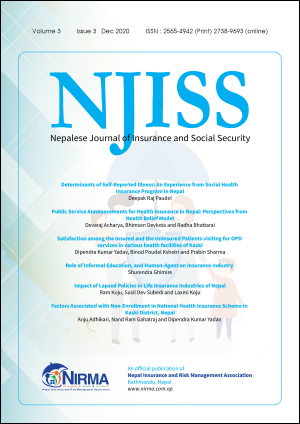Determinants of Self-Reported Illness: An Experience from Social Health Insurance Program in Nepal
Keywords:
Illness reporting, Health insurance, PovertyAbstract
Even though the ultimate goal of social health insurance program is to increase the utilization of health services and reduce the health care expenditure, individuals in developing countries generally do not visit a healthcare provider or spend on healthcare unless they perceive themselves as ill. Thus, the determinants of such illness reporting could have practical significance in a setting, where the social health insurance program was first being implemented in Nepal.
Philosophically, this study follows a post-positivism or empiricism research paradigm. The ontological assumption of this study is a singular reality and regarding the epistemological assumption, this study considers an objective reality, a deductive method of quantitative inquiry. A cross-sectional survey was performed among 6480 individuals from 1048 households located in 26 wards of Kailali district after twenty-one months of the implementation of health insurance program in Nepal. The sample was selected in two stages, first being the selection of wards and second being the households. Data analyses were mainly based on chi-square test and logistic regression analysis.
The study revealed that out of total 6480 surveyed individuals, 1590 (24.5%) individuals reported illness and the most commonly self-reported illness was cold/cough/fever in the month prior to the survey. The logistic regression analysis revealed that a number of socioeconomic factors such as health insurance coverage, gender, education level, economic status and employment status are significant predictors of illness reporting. Being insured, household members were more likely to report illness compared to their counterparts (Odds ratio= 1.40, 95% Confidence Interval=1.24-1.59). Females were more likely to report illness compared to males. Members with secondary level of education were significantly less likely to have illnesses than the members with no formal education. Household members from higher household economic status and employed were significantly less likely to have an illness.
The findings from this study could inform policy in the ongoing national health insurance debate in Nepal and elsewhere. Since individuals having health insurance are more likely to report illness compared to uninsured, there is need to expand the health insurance program thought the country. Despite some methodological constraints, this study delivers new information on the occurrences of self-reported illnesses among the Nepalese population. This can help policy makers to formulate proper interventions to protect the poor from the financial burden associated with poor-health.
Downloads
Downloads
Published
How to Cite
Issue
Section
License
Copyright © Nepal Insurance and Risk Management Association

The articles in NJISS are licensed under a Creative Commons Attribution-NonCommercial 4.0 International License. This CC BY-NC license allows reusers to distribute, remix, adapt, and build upon the material in any medium or format for noncommercial purposes only, and only so long as attribution is given to the creator.
It includes the following elements:
BY - Credit must be given to the creator (authors)
NC - Only noncommercial uses of the work are permitted.

